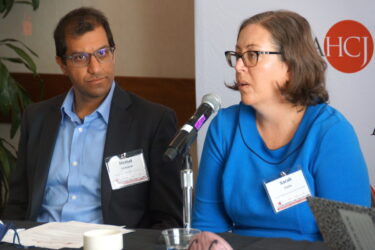 By this point, anyone who’s been covering or following COVID-19 knows that several comorbidities substantially increase the risk of complications and severe disease. Among those mentioned most often are diabetes, heart disease and obesity.
By this point, anyone who’s been covering or following COVID-19 knows that several comorbidities substantially increase the risk of complications and severe disease. Among those mentioned most often are diabetes, heart disease and obesity.
We learned of the associations between those conditions and more severe disease first from clinical anecdotes, then case series, then observational studies. But observational studies can almost never show causation. (I don’t think they can ever, on their own, show causation, but I add the “almost” because nothing in science is ever absolute.) Although diabetes is linked to poorer outcomes with COVID-19, it doesn’t mean having diabetes causes poorer outcomes.
A major reason observational studies can’t show causation is that confounding factors can interfere with interpreting the data. If you don’t adjust for the right confounders — without over-adjusting—you may draw inaccurate conclusions from the findings.
As Robert Rosencrans, an M.D./Ph.D. student at the University of Alabama at Birmingham, pointed out on Twitter recently, our biases can inadvertently lead us to draw conclusions without sufficient data that’s been adequately adjusted — especially when it comes to bias about obesity.
Much rhetoric around obesity as a critical pre-existing condition for Covid-19.
A key lesson from H1N1 epidemic: meta analyses (n=25,189) showed an odds ratio of 1.8 for fatality amongst obese people. Until they controlled for one key variable
1/n#HAES #fatphobia #medtwitter
— robert rosencrans (@rfrosencrans) August 1, 2020
“Much rhetoric around obesity as a critical pre-existing condition for Covid-19,” he tweeted last month, then noting that obesity had once been a similar risk factor for H1N1 mortality. A meta-analysis of 22 studies involving 25,189 people found that the odds of death nearly doubled (odds ratio of 1.8) for people with obesity—“until they controlled for one key variable.”
The researchers looked at when patients received treatments and how that correlated with their body mass index (BMI). “Smaller bodied people *systematically* received earlier antiviral treatment than larger bodied people,” Rosencras tweeted. “Controlling for this difference eliminates impact of obesity on H1N1 fatality. Obesity kills, but the critical mediator is not biology, it’s bias.”
Indeed, adjusting the findings to account for timing of antiviral treatment dropped the odds ratio from 1.8 to 1.14 with a confidence interval that crossed the 1 (0.94-1.39), rendering it not statistically significant. In a way, it suggests that obesity is the cause of the higher risk of death but not because of any physiological process that makes obesity, in and of itself, more dangerous to someone with H1N1 flu. Instead, it’s an unconscious/implicit (presumably, hopefully) signal to health care providers to delay care.
“The modifiable variable here is not peoples’ sizes,” he tweeted. “It’s provider behavior. That should be as empowering as it is troubling. We have a responsibility to reduce the harm of fat phobia, particularly in its racialized and gendered manifestations.”
Rosencrans does point out that COVID-19 is not H1N1, and we can’t extrapolate or generalize data from one to another, but the known phenomenon of fat phobia and obesity bias in the practice of medicine “should encourage us to think critically about the current alarm bells,” he wrote.
There’s a rich and growing evidence base on the negative health impact of obesity bias in healthcare, and it’s something Roxane Gay delves into in her book “Hunger.” Stigma about obesity is so strong in our society that health journalists can easily succumb to it as well, whether they realize it or not.
We don’t yet know whether obesity is, by itself physiologically, a contributing factor to more severe disease with COVID-19. There are ways that could be possible, but it doesn’t mean it is. But evidence does show that people with obesity often receive substandard care compared to people without obesity, and it’s vital that journalists and researchers don’t overlook that likelihood and its ramifications in this pandemic.









